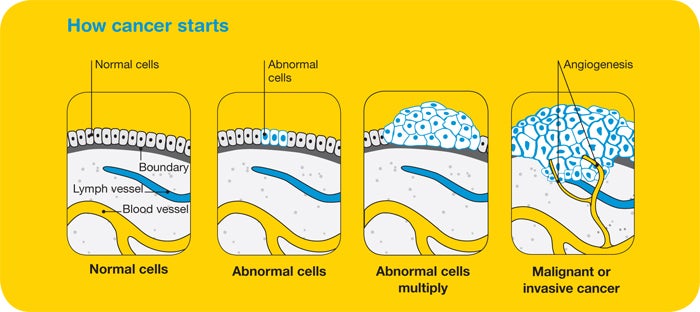
What is cancer?
Cancer is a disease of the body’s cells. Normally cells grow and multiply in a controlled way, however, sometimes cells become abnormal and keep growing. Abnormal cells can form a mass called a tumour.
Cancer is the term used to describe collections of these cells, growing and potentially spreading within the body. As cancerous cells can arise from almost any type of tissue cell, cancer actually refers to about 100 different diseases.
How does cancer develop and spread?
As mutant cells (those with mistakes in their genetic blueprint) grow and divide, a mass of abnormal cells, or a tumour, is formed. In some cases, these cells will form a discrete lump, in other cases such as leukaemia, abnormal blood cells are in the body.
Cancer cells can break away from the mass (or tumour) and travel via the bloodstream or lymphatic system to different parts of the body. These cells can settle in other parts of the body to form a secondary cancer or metastasis.
Cancer can cause premature death because these secondary cancers stop parts of the body from working properly.
How many Australians get cancer?
Cancer is a common disease and a major health problem in Australia today. At current rates, it is expected one in two Australians will be diagnosed with cancer by the age of 85.
An estimated 145,000 new cases of cancer will be diagnosed in Australia this year.
Cancer is a leading cause of death in Australia – almost 55,000 deaths from cancer were estimated for 2019.
Compared to 1982, around 25,000 more people die each year from cancer. This is due mainly to population growth and ageing. However, the death rate (number of deaths per 100,000 people) has fallen by more than 24%.
More than 66% of people diagnosed with cancer in Australia will survive more than five years after diagnosis.

To find out more about cancer go to: www.cancer.org.au/cancer-information/what-is-cancer
Cancer Council Australia
ABN: 91 130 793 725
Tel: (02) 8063 4100
Fax: (02) 8063 4101
Email: info@cancer.org.au
